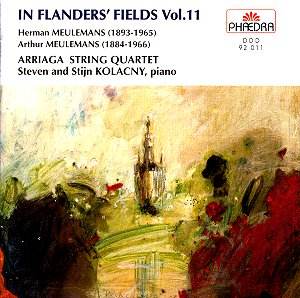Arthur Meulemans, undoubtedly the most significant
Flemish composer of his generation, has the lionís share here,
and deservedly so. His huge output includes fifteen symphonies,
operas, many orchestral works and several concertos as well as
a lot of vocal and instrumental music. His five string quartets
roughly span the whole of his long and prolific composing life.
His first essay (Uit mijn Leven) dates from 1907
and the Fifth String Quartet was completed in 1953. The Second
and Third String Quartets (1932 and 1933 respectively) are, to
a certain extent, transitional works still embedded in the early
Romantic tradition but already clearly influenced by Impressionism.
Both share a number of features, stylistically and formally. Both
are conceived as suites of character pieces rather than as intricately
worked-out compositions. There is little thematic relationship,
if any, between the movements. Moreover, both are light-hearted
pieces of great melodic charm rather than big pieces of great
depth and complexity. These are engaging works, superbly crafted,
richly melodic and beautifully written for the strings.
The Piano Quintet of 1946 (and
not 1916 as I erroneously mentioned in my composerís profile some
time ago) retains most qualities of the earlier works. It too
is in the nature of a colourful divertimento with a beautifully
lyrical slow movement. Again it does not set out to plumb any
great depths it is a quite attractive work.
Arthurís younger brother Herman followed his
brotherís steps. He too studied at the Lemmens Institute and later
succeeded his brother as head of the Organ School in Hasselt.
He composed a considerable amount of music which is largely neglected
at the time of writing. The piano pieces recorded here (we are
not told when they were composed) show him as a miniaturist writing
salon music of quality, but light in tone and content. When listening
to these charming vignettes, it is hard to imagine that Herman
Meulemans had a great knowledge of modern music and was an admirer
of Bartókís music. In his insert notes, Denijs Dille, honorary
director of the Bartók Archives in Budapest, recalls that
it was Herman Meulemans who kindled his interest in early 20th
Century music and in Bartókís works.
So, in short, attractive works in excellent performances
and good recording. Well worth having, were it only to convey
an idea of Arthur Meulemansí music in its lighter mood. It certainly
whets oneís appetite for more Meulemans recordings. Phaedra is
planning another disc entirely devoted to short orchestral works
of Arthur Meulemans.
Hubert Culot
